◊ By Romy Bernal Diaz. Photos courtesy of The Timbaktu Collective
Note: To find organic brands, organic shops and organic product suppliers in India, buy the Organic Directory
Since 40 years, Mary Vattamattam has been working with marginalised communities in rural India, mobilising them through organic agriculture. She has made pioneering contributions towards women’s empowerment, child rights, alternative education, and disability rights in Andhra Pradesh’s Srikakulam and Anantapuram districts.
In 1990, along with her husband, Choitresh Ganguly, Vattamattam established the NGO, The Timbaktu Collective, in Anantapuram, which focuses on the education of people in rural areas, especially those plagued with drought, infertile land and unemployment, with an emphasis on women, children, and dalits. Timbaktu also promotes the farmer producer company, Dharani FaM CooP Ltd, which owns the organic food brand, Timbaktu Organic.
Today, The Timbaktu Collective has more than 22,000 families from 178 villages associated with it, with a capital base of Rs 25.16 crore. The NGO’s area of work includes ecological restoration of waste, organic farming, alternative financial systems based on thrift-and-credit for women, the breeding of small ruminants, disability rights, and provision of child-friendly fora.
Vattamattam has taught women how to take control of their lives through agricultural activities, how to participate actively in local decision-making, and under Timbaktu’s guidance, four thrift-and-credit cooperatives for women have been formed. Furthermore, she has created the Nature School (aka Prakruthi Badi), which practices an alternative education system.
In recognition of her developmental work, Vattamattam has received several awards, including the Vanitha Woman of the Year award (2010), conferred by Manorama Group. She was also among Grassroots Women of the Decade (2014) by the Women’s Economic Forum. Along with her husband, she won the Couple of the Year award (2005), conferred by The Week magazine, as well as, the One World Award (2014), awarded by Rapunzel Naturkost, the leading natural health food company in Germany.
This correspondent had the opportunity to interview Mary Vattamattam ahead of the 2nd International Seminar on Organic Agriculture – Chile 2019, which is scheduled to take place in Temuco, Chile, on 21 and 22 of October.
She will participate in the event as speaker, and will shed light on rural development through organic production, as well as, the role of women in organic agriculture. Her organisation, The Timbaktu Collective, will also participate in the event as exhibitor. Below are excerpts from the interview.
What motivated you to establish The Timbaktu Collective?
The most important motivation for me was to work for societal change and transformation in the areas of poverty eradication and gender equity. Globally, and especially in India, there is huge disparity in the status of men and women across different fields. I wanted to challenge and address societal constructs that marginalised people or gave them a lower or higher status. For example, the caste system, ability/disability, differentiating between adults and children, class, etc.
At the same time, I was also concerned about agrarian distress, ecological degradation and related issues, and wanted to find ways and means of addressing them in a meaningful way. I was inspired by the possibility of working out practical solutions, tangible results, and alternatives in resource-poor regions. My previous work of unionising agricultural labourers brought out the idea of building democratic people’s institutions that would be sustainable.
By the time we registered The Timbaktu Collective in November 1990, I had already aggregated 12 years of experience as a community organiser and social worker. This experience played a big part in defining the activities of the collective.
I had previously worked for two years with marginalised communities in the state of Telangana, wherein I focused on organising and mobilising people to work collectively for financial independence. I then worked for six years in Andhra Pradesh, where I worked with tribal communities on social forestry, adult education, land development, environmental camps for youth, etc. From 1986 to 1990, I worked with another organisation in Anantapuram to mobilise and unionise agricultural labourers.
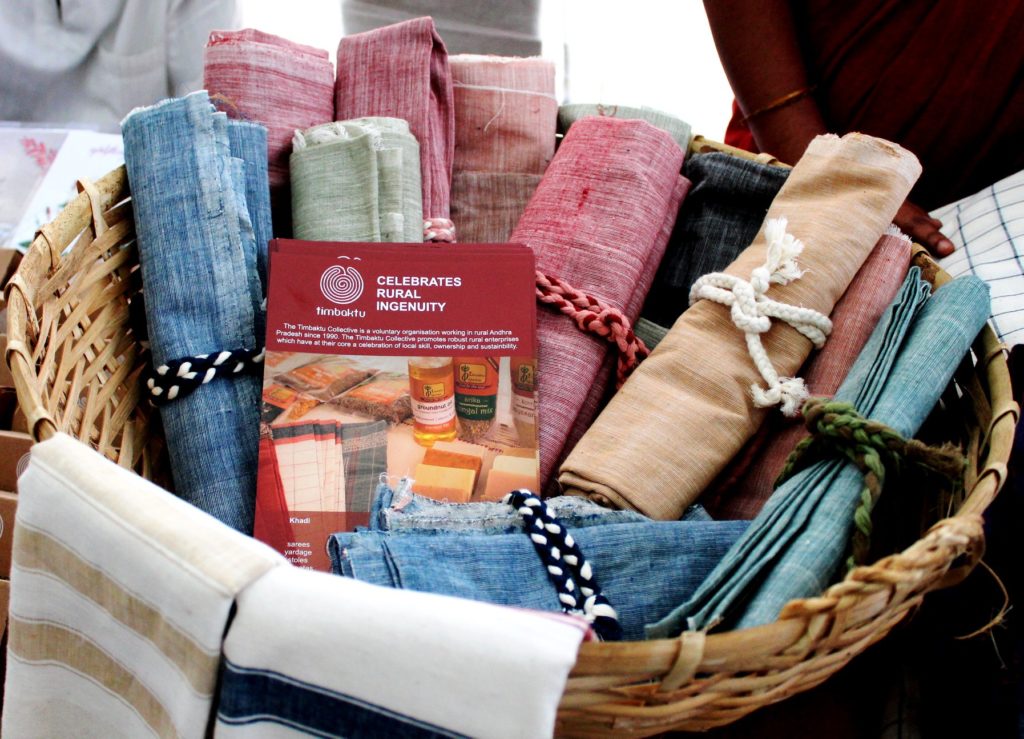
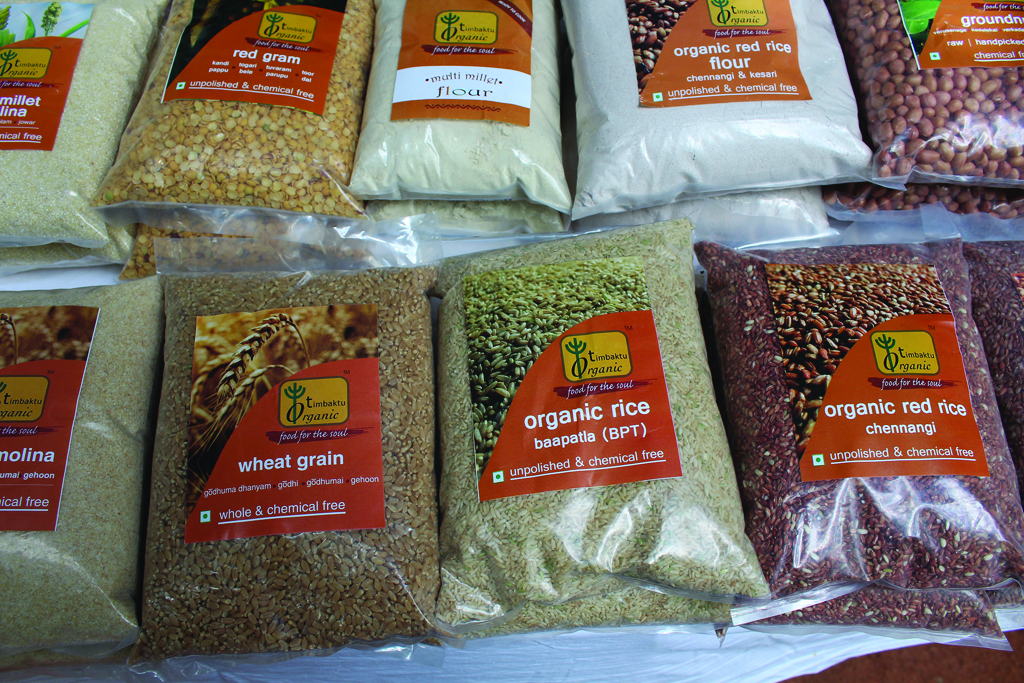
The Timbaktu Collective also promotes the farmer producer company, Dharani FaM CooP Ltd, which owns the organic food brand, Timbaktu Organic
In what way is the role of women significant in organic agriculture, and what actions should be taken by governments to encourage their active participation in this area?
In India, women are a central part of farming in general, and of organic farming in particular. However, their role is not recognised despite the range of activities (weeding, sowing, harvesting, seed storage, etc) they actively participate in. They are simply not perceived as farmers.
In terms of national/state policy, the most important action is the ownership of land by women farmers. While most governments say this is a priority, this issue continues to be ignored. Women are farmers too, which must be acknowledged. And as farmers, they must be owners of land. Unless this changes, the major problems will persist. In the context of the family as a unit, and the man being the so-called head of the family, women’s rights are continually curtailed.
Any benefit and outreach from the government should target both men and women. Even in the case of single women, land ownership is key. While women-headed households can technically be covered by government schemes, their impact will be superficial unless land ownership is guaranteed.
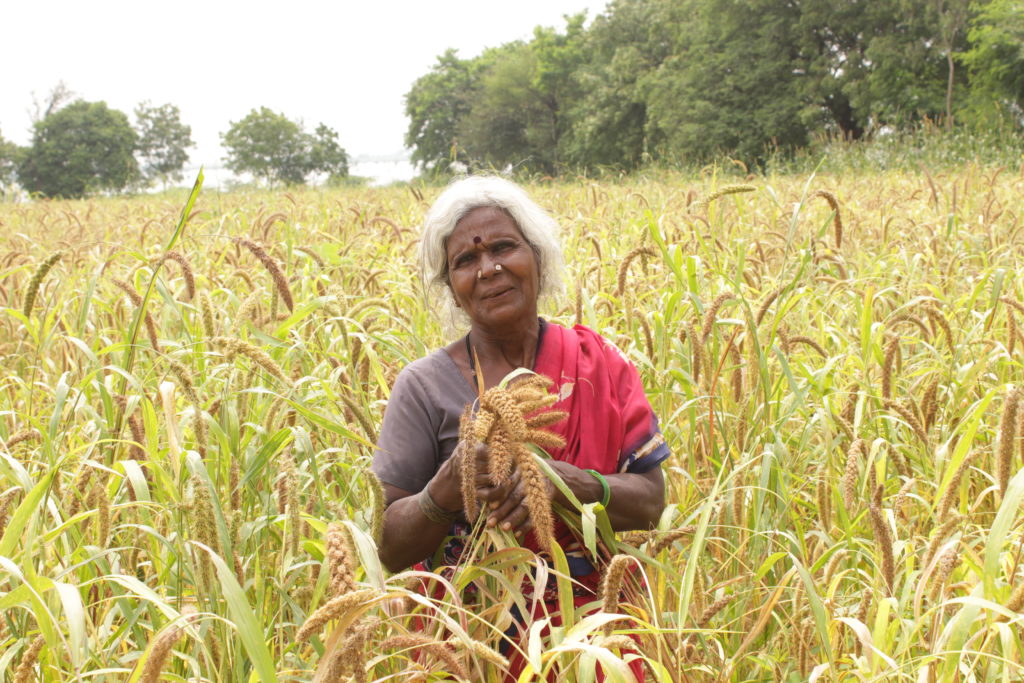
“In India, women are a central part of farming in general, and of organic farming in particular. However, their role is not recognised despite the range of activities (weeding, sowing, harvesting, seed storage, etc) they actively participate in”
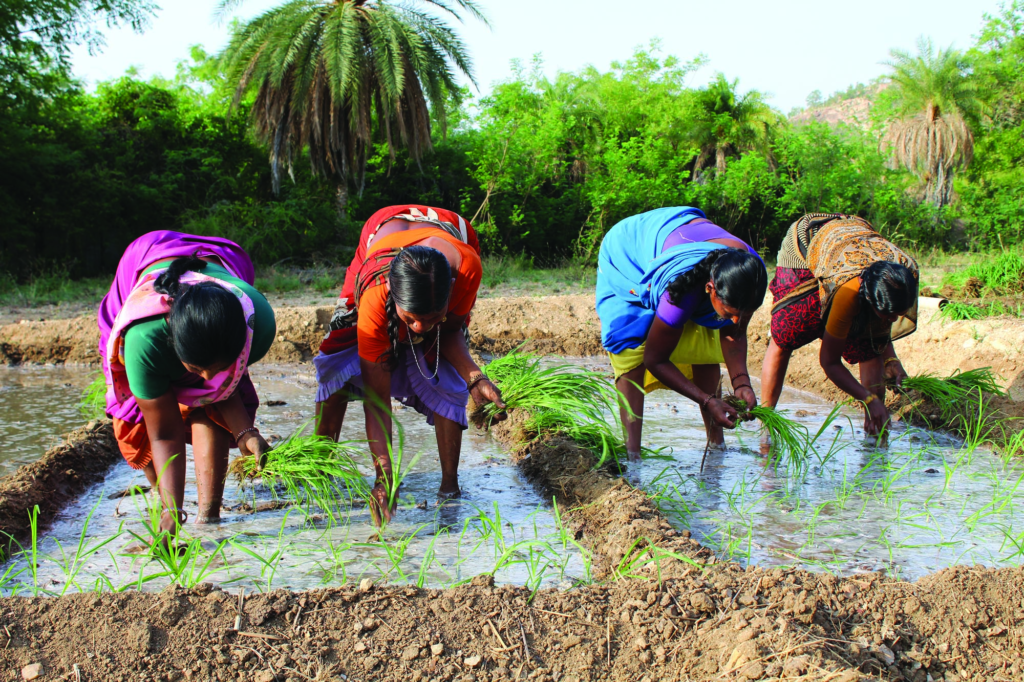
“Women are farmers too, which must be acknowledged. And as farmers, they must be owners of land. Even in the case of single women, land ownership is key. While women-headed households can technically be covered by government schemes, their impact will be superficial unless land ownership is guaranteed”
Tell us about the collective’s Nature School and your ecological child rights initiative.
The Nature School is a semi-residential primary school (from class 1 to class 5), which caters to children from underprivileged or disadvantaged families, who are in dire need of protection, care and support. The school provides a platform for these children—who usually drop out or get sucked into the child labour workforce—to experience learning in a pressure-free environment, develop their potential, and become sensitised to environmental and ecological issues.
The Nature School currently has 50 students. Since 1992, it has enabled more than 1,500 children to complete schooling. It is influenced by a lot of experiments and perspectives in alternative education, particularly books such as Summerhill and Totto-Chan and educational systems such as the ones practised in Rishi Valley School, as well as, the Waldorf schools. These alternative approaches allow children to hone their creativity, and awaken them to nature and their surroundings at large.
The concept of Ecological Child Rights refers to the right of children to an environment that is beneficial, safe and diverse. We are promoting this concept through our Mogga project, which involves more than 2,000 children from 42 villages—all of whom are part of youth clubs.
With support from Terre Des Hommes (Swiss organisation for children’s aid), we promoted the concept of ecological child rights and we continue to focus on this concept today. The focus is on imparting training on ecological concerns—pollution, climate change, impacts of chemical intensive farming, plastic waste, etc—and supporting children to actively take up community actions.
As part of the training curriculum, children are asked to define what they would want to do as a solution to the crisis at hand. Some of the examples of community actions are plastic disposal drives, setting up organic kitchen gardens, and visiting the Kalpavalli Community Conservation Area (which Timbaktu protects in partnership with local communities) for seed dibbling and tree planting.
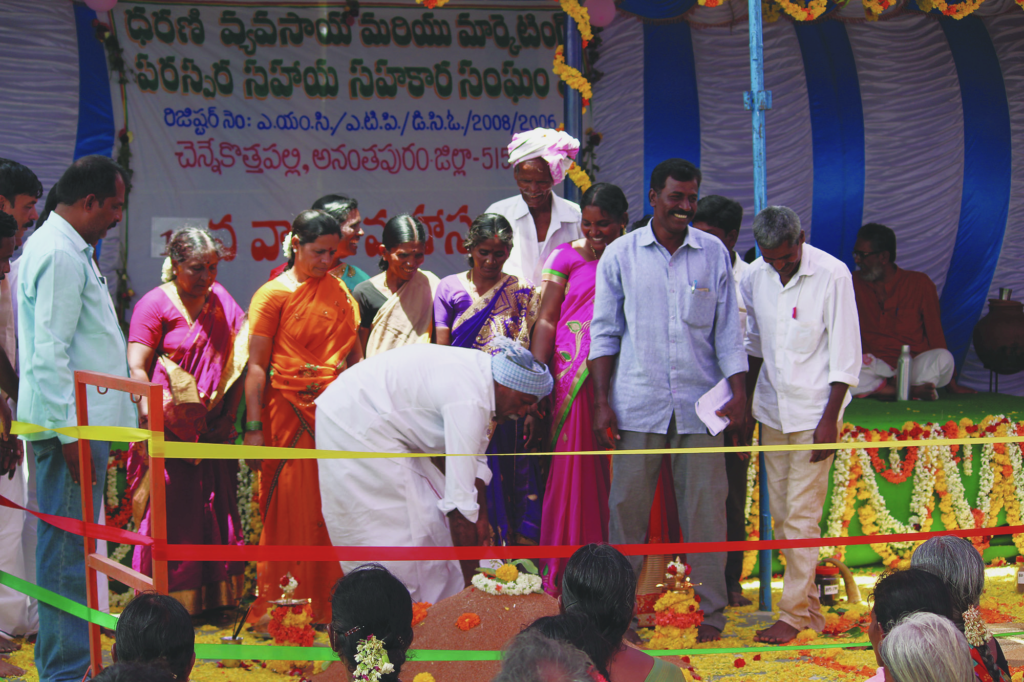
Directors of Dharani FaM CooP Ltd inaugurate its 10th annual general meeting in Chennekothapalli village in Anantapuram
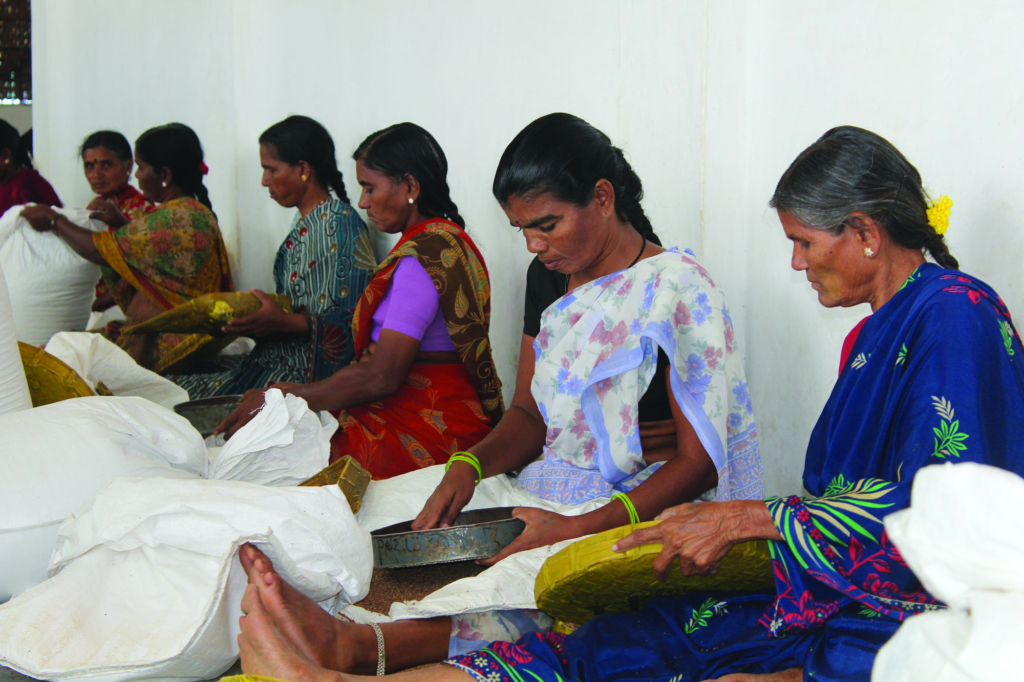
Members of Dharani FaM CooP Ltd at work
What is the importance of organic agriculture in the context of environmental and social development?
The environmental benefits of organic farming are improved soil health and fertility, safe groundwater, increased nutrient/cycling, increase in biodiversity of flora and fauna, protection against climate change, etc. The chief social benefits are improved health, low input costs, seed sovereignty and self-reliance.
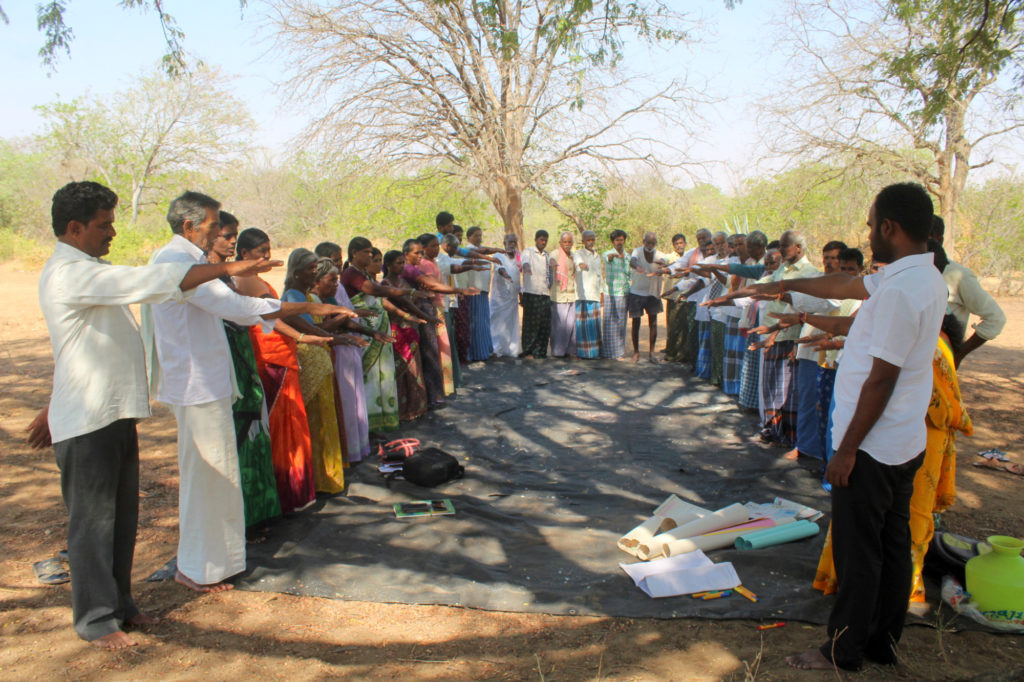
Farmers associated with The Timbaktu Collective take a pledge to use only organic practices
What motivated you to participate in the 2nd International Seminar on Organic Agriculture – Chile 2019, which will take part in Temuco this month?
I believe my 40 years of experience working with marginalised communities in the rural areas of India is worth sharing at the Organic Agriculture Seminar in Chile. When Rodrigo Rojas Cheuquenao (convenor of the event) visited us in 2017, he was keen to learn about Timbaktu’s organic agriculture programme and its approach of promoting cooperatives. I see the seminar as a great opportunity to share my learnings of decades, and also learn from the farmers of Chile, as well as, others present.


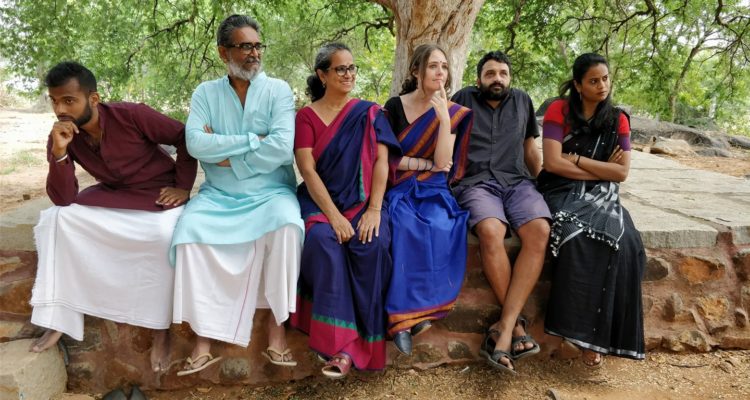
We are Mumbai based Startup company looking for reliable suppliers of certified Organic Products in following categories.
1. Oil seeds
2. Spices and Herbs
3. Grains and Pulses
if you are able to supply or connect farmers who grow organic products please let us know. we buy in wholesale.
Thanks and Regards
Ashok Agarwal
Goregaon E
Mumbai 400064